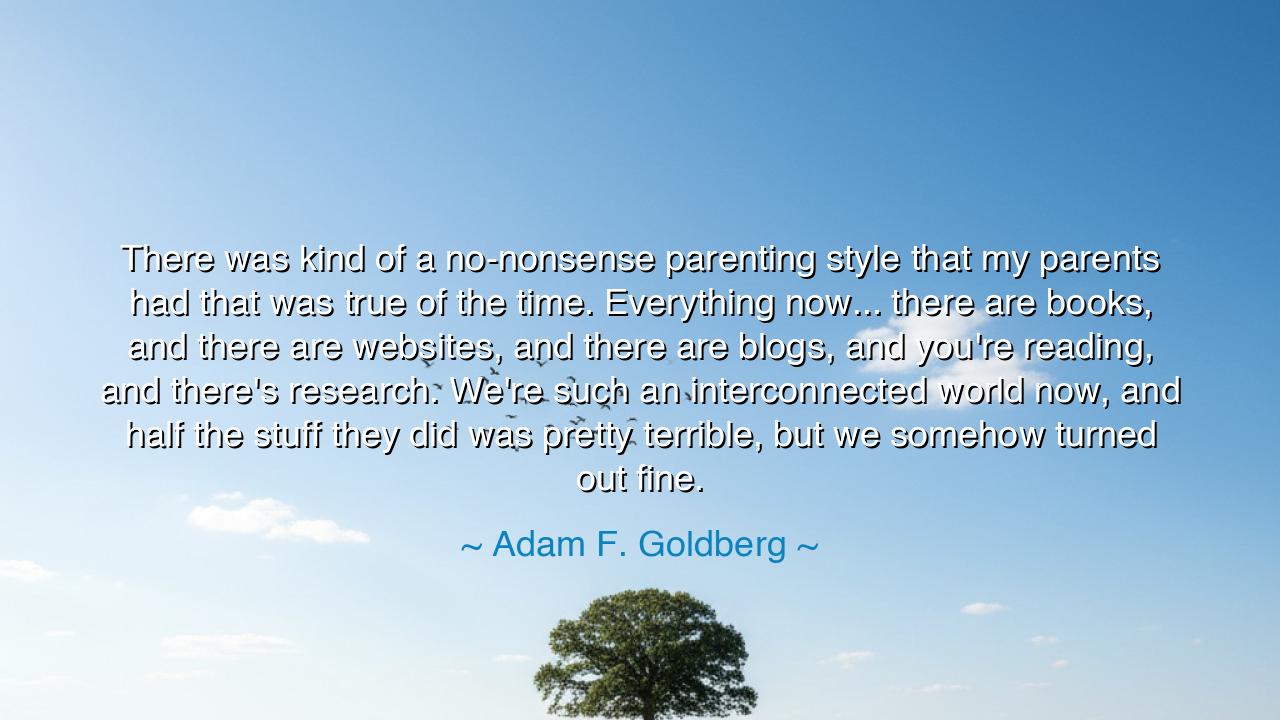
There was kind of a no-nonsense parenting style that my parents
There was kind of a no-nonsense parenting style that my parents had that was true of the time. Everything now... there are books, and there are websites, and there are blogs, and you're reading, and there's research. We're such an interconnected world now, and half the stuff they did was pretty terrible, but we somehow turned out fine.






Hearken, O children of generations yet to come, and lend ear to the words of Adam F. Goldberg, who speaks with the voice of reflection and measured insight: “There was kind of a no-nonsense parenting style that my parents had that was true of the time. Everything now... there are books, and there are websites, and there are blogs, and you're reading, and there's research. We're such an interconnected world now, and half the stuff they did was pretty terrible, but we somehow turned out fine.” In these words lies a meditation upon the evolution of parenting, the endurance of the human spirit, and the unseen forces of resilience and adaptation that shape the child beyond method or doctrine.
The origin of this reflection rests in Goldberg’s own experience as a child of an earlier era, where parenting was direct, pragmatic, and often stern. His parents embodied the no-nonsense approach characteristic of their time: rules were clear, expectations firm, and emotion often restrained. There were no guides, no manuals, no online forums; there was only the lived wisdom of the elders, imperfect yet deeply human. From this crucible of experience, Goldberg discerns that children may flourish despite the rigidity—or even harshness—of their upbringing, revealing the fortitude that emerges from challenge and structure.
The meaning of his words is subtle yet profound. Parenting, he suggests, is less about perfection and more about presence, intention, and the enduring influence of daily life. Though modern society offers books, research, blogs, and endless guidance, the essence of raising a child is neither found solely in instruction nor in method. Children absorb lessons from the consistency, boundaries, and lived example of their guardians, even when these methods appear flawed or outdated. In this lies a timeless truth: resilience and growth often emerge in spite of, rather than because of, perfect pedagogy.
Consider the life of Ernest Hemingway, whose upbringing was marked by both structure and sternness. Though some of his father’s methods might today seem harsh, Hemingway absorbed lessons of courage, curiosity, and self-reliance. He ventured boldly into the world of literature, adventure, and discovery, shaped not only by formal teaching but by the examples and expectations of his parents. Goldberg’s reflection mirrors this timeless pattern: children often thrive when provided guidance tempered with firmness, even amidst imperfections.
Yet Goldberg’s words carry a subtle recognition of the modern shift. Today, parenting exists in a world of interconnectedness, information, and research, where every action may be scrutinized and every choice guided by advice. While this knowledge is a boon, it can also overwhelm, leaving parents anxious or hesitant. The contrast between the old ways and the new reveals that human adaptability and the spirit of the child often transcend methodology, and that growth emerges from lived experience as much as from instruction.
The lesson for future generations is luminous: the perfection of method is not the measure of effective parenting. What matters is presence, consistency, and love, combined with boundaries and guidance appropriate to the child’s character. Mistakes, sternness, or rigidity are not fatal; they are threads woven into the larger tapestry of growth, resilience, and understanding. Children learn not merely from advice, but from the example, structure, and humanity of those who nurture them.
In practical life, one may follow Goldberg’s counsel by embracing both humility and intention in the act of raising children. Use knowledge and guidance where it aids, but recognize the limits of method and the importance of lived experience. Model resilience, empathy, and curiosity. Accept that mistakes are inevitable, yet the enduring presence of care, structure, and example will shape the child more profoundly than any perfect plan.
Thus, O children of future ages, carry this teaching as both lamp and compass: the essence of parenting lies not in perfection, but in intention, presence, and lived example. Honor the balance between guidance and experience, structure and freedom, firmness and love. In this delicate equilibrium, children learn to navigate the world with resilience and understanding, and the legacy of nurturing endures, transcending the eras, methods, and imperfections of those who raise them.






AAdministratorAdministrator
Welcome, honored guests. Please leave a comment, we will respond soon